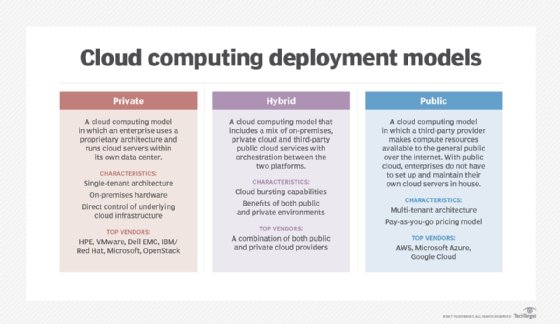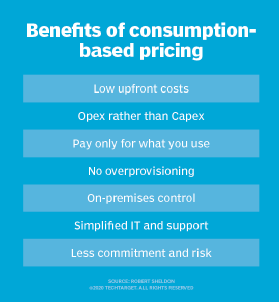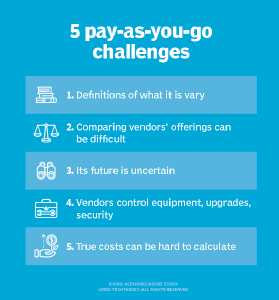metered services (pay-per-use)
What are metered services (pay-per-use)?
Metered services (also called pay-per-use and consumption-based pricing) are any type of payment structure in which a customer has access to potentially unlimited resources but only pays for what they actually use. Metered services are becoming increasingly common in enterprise IT environments.
Examples of metered services
With utility computing, for example, a company can purchase computing resources to match fluctuating needs. This approach is promoted as being more cost-effective for the company than maintaining a large infrastructure that exceeds the company's average computing power requirements.
Metered billing is also gaining popularity in the consumer market. While most utility companies have always used a metered service model, some internet service providers (ISPs) have also implemented a pricing model based on actual usage instead of charging a flat monthly subscription fee.
A growing number of entertainment websites also use a pay-as-you-go structure. Apple's iTunes, for instance, allows users to sample music files for free, but charges the user a small fee for a complete download of any given song.
Other examples include metered usage cloud pricing for infrastructure-as-a-service (IaaS), platform-as-a-service (PaaS) and software-as-a-service (SaaS) cloud services from public cloud providers like Amazon Web Services (AWS) and Microsoft Azure.

Considerations for choosing metered services
While subscription billing is more cost-effective for some organizations, it can also result in instability in the billing structure for businesses that rely heavily on those services to operate their business. The following are a few key considerations to weigh when considering a service that provides a pay-as-you-go subscription model.
- How frequently do usage patterns fluctuate? If overage fees are incurred infrequently, an elastic pricing model that accommodates the occasional overage in customer usage may be appropriate. However, if usage is consistently high, it may be more cost-effective to opt for a higher, flat pricing tier.
- Does the service offer higher pricing tiers? It's important to calculate typical total usage metrics over several billing cycles to determine whether metering services will actually save more money, or if it would be better to simply upgrade a base plan to a premium plan.
- Is the business capable of provisioning additional bandwidth as needed to accommodate a CPU resource fluctuation? If not, metered billing model would be more cost-effective than risking downtime due to a server outage.
Examples of pay-as-you-go IT hardware offerings
Consumption-based, pay-per-use model has gained traction as an alternative payment method for IT hardware over the last several years. Here are some examples of products that fall into that category.

Dell Technologies On Demand
On Demand features three options: Pay As You Grow (customizes payment terms as resources are consumed), Flex on Demand (lets organizations expand or decrease usage as needed) and Data Center Utility (customer billed monthly based on usage).
Hewlett Packard Enterprise GreenLake
GreenLake allows users to pay only for the IT resources (storage, hyper-converged, composable, etc.) they use.
Lenovo TruScale Infrastructure Services
TruScale allows organizations to pay for Lenovo infrastructure products on demand monthly and with no minimal commitment.

NetApp Keystone
With Keystone, users commit to a minimum storage capacity and timeframe for various storage services at one of three performance levels for on-premises equipment supported by NetApp. Either the customer runs it as an IaaS or NetApp runs it as a managed service.
Pure Storage Evergreen
Those buying Pure Storage FlashArray and FlashBlade hardware can subscribe to the Evergreen Storage service to get technology refreshes of hardware controllers and storage capacity on premises.








